|
|
|
Sort Order |
|
|
|
Items / Page
|
|
|
|
|
|
|
| Srl | Item |
| 1 |
ID:
187249
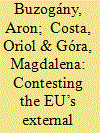

|
|
|
|
|
| Summary/Abstract |
This article analyses how populist parties in power contest the external democratization agenda within the European Union (EU)’s European Neighbourhood Policy (ENP). We present an analytical framework that conceptually unpacks both contestation and populism to argue that radical right, market liberal, regionalist and left-wing populist parties differ from each other concerning their views on external democratization. Our empirical focus is on the discursive strategies of Members of the European Parliament (MEPs) from PiS, Fidesz, Lega, Forza Italia and Movimento Cinque Stelle in European Parliament (EP) debates. The exploratory analysis reveals that populist actors rarely and selectively use the European arena for contesting democracy promotion. While an emphasis on stability and security in the neighbourhood prevails among all populist parties in our study, other considerations, such as migration policy, support for ethnic kin, suspicion towards Russia but also membership in the EP’s Party Groups inform the differences between the parties.
|
|
|
|
|
|
|
|
|
|
|
|
|
|
|
|
| 2 |
ID:
180561
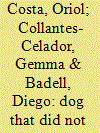

|
|
|
|
|
| Summary/Abstract |
The cosmopolitan character of the International Criminal Court (ICC) is not immune to the growing surge in the contestation of international institutions. The African Union’s reaction to the ICC decision to indict the then sitting heads of state of Sudan and Kenya, and the actions undertaken by the Trump Administration against the Court over possible investigations into Afghanistan and Palestine, are cases in point. This article explores what that surge has meant for intra-EU debates on its position towards the ICC. We present a two-fold argument based on an empirical analysis of key moments in the institutional development of the Court that coincide with the pre- and post-rise phases in the politicisation of international institutions. First, the level of agreement on the ICC within the EU has been grossly exaggerated. Second, despite bouts of disagreement, patterns of political conflict over the ICC within the EU remain constant. That is, there is recurrent polarisation, with a range of opinions on the intractable debate about Westphalian sovereignty vs. cosmopolitan justice, but no change in the other two dimensions of politicisation (salience and actor range).
|
|
|
|
|
|
|
|
|
|
|
|
|
|
|
|
| 3 |
ID:
092877
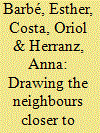

|
|
|
|
|
| Publication |
2009.
|
| Summary/Abstract |
The European Neighbourhood Policy (ENP) launched in 2004 was purposefully conceived as a strategy to encourage neighbours' approximation with the European Union (EU). This aim by the EU to extend its own system of rules beyond member states has become the focal point of the literature on the EU's relations with neighbours. In this article, however, we aim to broaden the scope of the analysis of the EU's role as it pursues policy convergence in the ENP area. More specifically, we argue that the convergence processes can be established on a basis other than EU's norms, namely, international and bilaterally developed norms. Building on this three-fold distinction, we propose a model explaining how and when policy convergence is more likely to happen on the basis of every one of these norms. The model takes into account three variables: the structure of incentives between the EU and its neighbours, mutual perceptions of legitimacy and intra-EU coherence. Based on a number of empirical examples, we illustrate that EU-based convergence is less predominant in EU's relations with its neighbours than it is usually portrayed in the literature.
|
|
|
|
|
|
|
|
|
|
|
|
|
|
|
|
| 4 |
ID:
180557
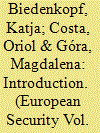

|
|
|
|
|
| Summary/Abstract |
Contestation and politicisation are two concepts of increasing relevance to European foreign and security policy (CFSP) scholars and practitioners alike. However, reasonable doubts can be raised as regards this growing literature: first, political conflict has always been part of CFSP, and national and European politics have traditionally been at the centre of research in this field. Second, exploring how the two concepts relate to European foreign, security and defence policies is complicated by the fact that foreign affairs more broadly do not meet all the criteria set by the literature on politicisation, which usually requires that some form of mass mobilisation takes place, or at least a high degree of salience. This article addresses these concerns by looking at the changing politics of CFSP. As the introduction to the special issue, we explore the hypothesis that contestation of European foreign, security and defence policy is now more in line with the broader way in which political conflict is being re-structured in Europe. If this is so, political conflict over CFSP will more easily be associated with issues that have an appeal beyond the narrow community of its practitioners and observers.
|
|
|
|
|
|
|
|
|
|
|
|
|
|
|
|
| 5 |
ID:
085409
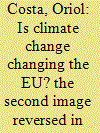

|
|
|
|
|
| Publication |
2008.
|
| Summary/Abstract |
The participation of the European Union (EU) in the international negotiations on climate change has attracted a significant share of scholarly attention. Climate change has certainly become a new dimension of European foreign policy and has enabled the EU to play a leadership role in the international arena. However, the relationship between the EU and the international climate regime is not a one-way street-while the EU has been active and decisive in shaping international negotiations, the latter have also had an impact on the EU. The international negotiations have influenced the EU's decision-making processes and internal negotiations-which has in turn influenced European integration itself. This article builds on the arguments of second image reversed analyses and proposes that there is a reciprocal relation between certain conditions of the EU-domestic setting and the international climate regime. The internal arrangements of the EU regarding climate change have maximized the influence of the regime and the very existence of the international negotiations has moulded these arrangements, making them more prone to external influence.
|
|
|
|
|
|
|
|
|
|
|
|
|
|
|
|
| 6 |
ID:
096850
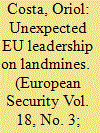

|
|
|
|
|
| Publication |
2010.
|
| Summary/Abstract |
The European Union (EU) has led international politics on antipersonnel landmines (APLs) for a decade now, and its foreign policy in this domain is perceived as a success story. Nevertheless, at the beginning of the negotiations that led to the Ottawa Convention, the EU looked unable to play any relevant part. This article addresses the emergence of the EU's foreign policy on APLs by arguing, in a second image-reversed way, that the corresponding international regime has deeply influenced the EU. It has changed Member States' and EU institutions' preferences, and it has empowered pro-Ottawa and pro-integration actors. This article explores the intra-EU conditions that have facilitated this influence and the way in which the regime itself has shaped them.
|
|
|
|
|
|
|
|
|
|
|
|
|
|
|
|
|
|
|
|
|